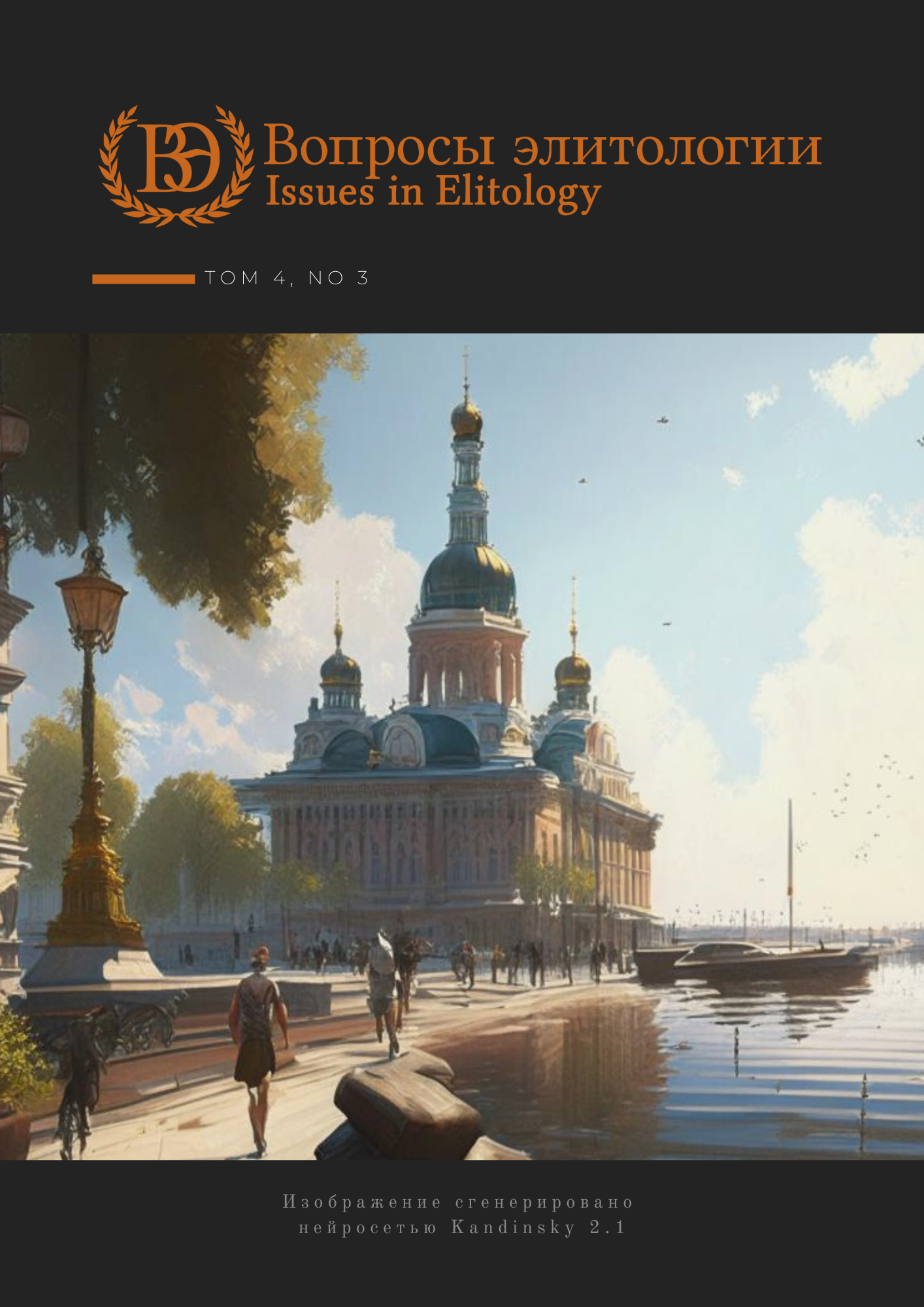Abstract
The purpose of this article is to study the basic foundations of the scientific and methodological apparatus for assessing the quality of elites, proposed by the University of St. Gallen (Switzerland), and its use for comparative measurements of the qualitative state of the national elites of the European and Eurasian Economic Unions based on the ranking of their member states.
The main steps to achieve the goal are the processes of studying: elites in modern social research, structural assessment of the state of elites, the "barometer" as a matrix of value creation, comparative characteristics of elite quality.
The results of the theoretical analysis confirmed the research interest in this problem, which can be considered both from formal conceptual (political) positions and in the conditions of the actual formation of a multipolar world order (geo-economic situation). The contours of these dimensions differ in historical processes, the typology of states and modern elites, which are heterogeneous and diverse, which allows certain evaluation conventions.
According to the priority principles of the formation of the elite quality index and the political and economic assessment of the impact of elite quality on social development, a wide combination of different indicators is used, "updating" of which is carried out on the basis of expert assessments of participants. Comparative analysis allows us to conclude about the subjectivity and politicization of some of the most important indicators. Therefore, the proposed methodology needs to improve the tools and use additional evaluation components, represented, for example, by global ratings on the level of prosperity, GDP per capita, etc.
References
Alexandrova, N. A. (2011). Status rent in the new political economy. Bulletin of N.A. Nekrasov KSU, 17(4), 15-20. (In Russian).
Amurov, M. A. (2020). Typology of modern political elites. Management Consulting, 5, 19-28 doi: 10.22394/1726-1139-2020-5-19-28 (In Russian).
BRICS Leaders' Meeting of the BRICS in an enlarged format. (2023). President of the Russian Federation. http://www.kremlin.ru/events/president/news/72089 (In Russian).
Casas, T., & Cozzi, G. (2021). Elite quality. Report 2021. Country scores and global rankings. Sustainable Value Creation - Fundamental issues for society Global metrics for long-term economic and human development. doi: 10.2139/ssrn.3845376
Casas, T., & Cozzi, G. (2023). Elite quality. Report 2023. Country scores and global rankings. The Sustainable Value Creation of Nations Measuring long-term economic and human development prospects.
Concept of the Foreign Policy of the Russian Federation, approved by the Decree of the President of the Russian Federation of 31.03.2023 No 229. (2023). President of the Russian Federation. http://www.kremlin.ru/acts/news/70811 (In Russian).
Extended meeting of the Presidium of the State Council on "On the Development of the Labor Market in the Russian Federation." (2023). President of the Russian Federation. http://www.kremlin.ru/events/president/news/72319 (In Russian).
Furs, S. P., & Fedoseev, A. A. (2021). Defining the elite quality index as a new type of social research. Culture and Security, 4, 5-10. https://doi.org/10.25257/kb.2021.4.5-10 (In Russian).
GDP per capita 1990-2022 (2022). Information on Nordic countries, Swedish and Norwegian language materials. https://svspb.net/danmark/vvp-stran-na-dushu-naselenija-wb.php (In Russian).
Georgieva, K. I. (2023). Fighting fragmentation where it matters most: Trade, debt and climate action, 16.01.2023. International Monetary Fund. https://www.imf.org/en/Blogs/Articles/2023/01/16/Confronting-fragmentation-where-it-matters-most-trade-debt-and-climate-action. (In Russian).
Glazyev, S. Y. (2018). A leap into the future. Russia in the new technological and world economic patterns. Knizhny Mir. (In Russian).
Golovin, V. G., & Golovina, E. E. (2021). Imperial ambitions of modern transnational corporations. Issues in Elitology, 2(3), 156-189. doi: 10.46539/elit.v2i3.77 (In Russian).
Golovin, V. G., & Golovina, E. E. (2022). Eurasian elites: State and prospects of development. Issues in Elitology, 3(3), 39-63. doi: 10.46539/elit.v3i3.116 (In Russian).
Golovina, E. E. (2020). Geoeconomics in the system of international relations. Internauka, 22(151), 64-66. (In Russian).
Grishin, S. Y. (2022). Transformation of the Russian socio-economic system in modern conditions. Izvestiya St. Petersburg State University of Economics, (6(138)), 91-96. (In Russian).
Held, D., Goldblatt, D., E., M., & J., P. (2004). Global transformations: Politics, economics, culture. Praxis. (In Russian).
Hunter, А. (2021). The World Economic Outlook database for April 2022—WEO groups and aggregates information. The UN List of Least Developed Countries as of November 2021. Wikimedia Commons. https://commons.wikimedia.org/w/index.php?curid=118625873
Karabushchenko, P. L. (2023). Elitology of creativity: The concept of creation of the good. Issues in Elitology, 4(1), 49-66. https://doi.org/10.46539/elit.v4i1.139 (In Russian).
Kazakova, V. I., & Novikova, M. N. (2009). Elite in the social space of modern Russia. Bulletin of Nizhny Novgorod University named after N. I. Lobachevsky. Series: Social Sciences, (1), 7-12. (In Russian).
Levina, E. I. (2009). The concept of "sustainable development": Main provisions of the concept. Bulletin of TSU, 11(79), 113-119. (In Russian).
List of developing, developed and undeveloped countries. (2021). NoNews | No News. https://nonews.co/directory/lists/countries/advanced-developing-market (In Russian).
Maruev, A. Y., & Evsyukov, A. A. (2018). Transnational corporations in the modern system of international relations. Vestnik of Moscow State University. Political Science, Ser. 12, (2), 93-102. (In Russian).
Rakhmanov, A. B. (2020). Business elites of the leading countries of the world in 2020: A comprehensive study . Bulletin of Tomsk State University Philosophy. Sociology. Political science, 56, 194-222. doi: 10.17223/1998863 (In Russian).
Ranking of the world's countries according to the index of the quality of elites. (2023). Center for Humanitarian Technologies. https://gtmarket.ru/ratings/elite-quality-index (In Russian).
Ranking of the world's countries by prosperity. (2023). Center for Humanitarian Technology. https://gtmarket.ru/ratings/legatum-prosperity-index (In Russian).
Schwab, K., & Mallere, T. (2020). COVID 19: The great reset. Forum Publishing. https://ekniga.org/dokumentalnaya-literatura/dokumentalistika/254193-covid-19-velikaya-perezagruzka.html (In Russian).
Sokolova, E. O. (2010). New Russian regional political elite. Megapolis Management, (4), 228-232. (In Russian).
UN. (2022). Department of Economic and Social Affairs, Population Division. World population prospects for 2022. https://population.un.org/wpp/Download/Standard/MostUsed/ (In Russian).

This work is licensed under a Creative Commons Attribution 4.0 International License.


